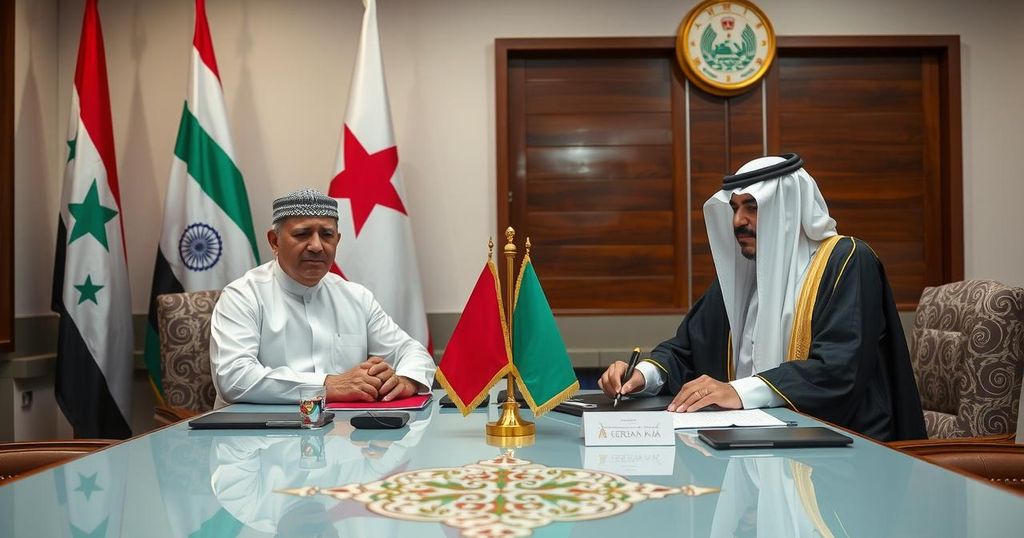Syria’s New Foreign Minister Pursues Diplomatic Relations to Revitalize Economy

Syria’s Foreign Minister Asaad al-Shibani is enhancing diplomatic relations with Qatar and other nations as the HTS seeks to stabilize governance following the ousting of Bashar Assad. Amid significant sanctions, he advocates for partnerships to rejuvenate Syria’s economy while emphasizing the dire living conditions of its citizens.
Syria’s newly appointed Foreign Minister, Asaad al-Shibani, engaged in diplomatic discussions in Doha with Qatar’s Foreign Minister and Prime Minister on January 5, 2025. This meeting marks a significant step for the Syrian authorities, headed by Hayat Tahrir al-Sham (HTS), as they seek to establish connections with regional and global powers. Al-Shibani plans to further enhance Syria’s international relationships by visiting Jordan and the United Arab Emirates to foster strategic partnerships aimed at aiding the nation’s security and economic recovery.
The Syrian officials have been proactive in expanding their diplomatic reach, having met with the Saudi Foreign Minister in Riyadh and welcomed the Foreign Ministers of Germany and France in Damascus earlier that week. This outreach comes after HTS orchestrated a swift insurgency that led to the fall of President Bashar Assad on December 8, ending a dynasty that controlled the country for decades. Following the collapse of Assad’s regime amidst civil strife, which resulted in significant humanitarian crises, many nations severed diplomatic ties with Assad due to his brutal suppression of dissent.
Under HTS’s administration, there is a concerted effort to re-establish international relations and alleviate the extensive sanctions previously imposed on Syria and its leadership. The ultimate aim is to rejuvenate the war-torn economy and improve living conditions for the citizens, with about 90% currently living in poverty and facing severe food insecurity.
In his discussions in Qatar, Al-Shibani emphasized the dire economic challenges brought on by international sanctions and reiterated calls for the United States to reconsider its stance on these measures affecting the Syrian populace. Further, Al-Sharaa, another significant figure within HTS, has proposed a national dialogue summit designed to convene diverse Syrian factions to create a new political framework, culminating in a constitution and subsequent elections. He expressed intentions to dissolve HTS during this transitional period to promote efficiency and unity in governance.
Despite these efforts, the likelihood of immediate sanctions relief from Washington remains uncertain, particularly in light of Europe’s apprehensions regarding governance under Islamist rule and its implications for women’s rights and religious minorities in Syria.
The political landscape in Syria has undergone significant changes following the insurgency led by Hayat Tahrir al-Sham, which resulted in the ousting of President Bashar Assad. Historically, the Assad administration faced severe backlash due to its oppressive measures against protests, leading to a violent civil war that claimed hundreds of thousands of lives. The region’s dynamics shifted as Assad’s allies, such as Russia and Iran, supported his regime, while countries like Qatar positioned themselves against it. As HTS now seeks to stabilize its governance and revitalize Syria’s economy, establishing diplomatic ties has become a priority, particularly with Arab nations that once opposed Assad. The impact of sanctions imposed on Syria has led to a humanitarian crisis, with the vast majority of the population living in poverty. The new leadership’s outreach aims to rectify these conditions and re-integrate Syria into the international community.
In summary, Syria’s new Foreign Minister Asaad al-Shibani is actively pursuing international diplomatic relationships as part of a broader strategy to recover from years of conflict and economic hardship. The establishment of connections with regional powers like Qatar, as well as discussions with Saudi Arabia and European nations, signifies a shift in Syria’s post-Assad political landscape. Nonetheless, the challenges posed by economic sanctions, particularly from the United States, remain a significant obstacle to stabilizing and revitalizing Syria’s economy, raising questions about the future of governance and human rights under the new regime.
Original Source: www.thehindu.com








